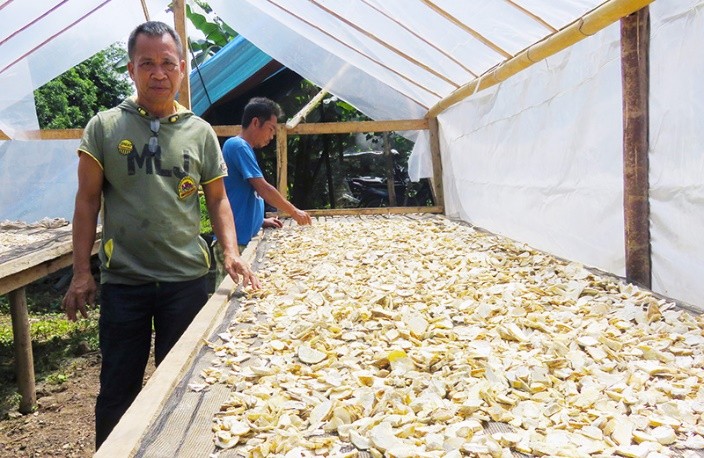Speeches Shim

October 2017—Samat Nasa has been farming cassava on the outskirts of Zamboanga City in the Philippines’ Mindanao region for over 30 years. Many farmers in the area grow this root crop because it is easy to maintain and can survive extreme weather. But because the Philippines is a predominantly rice-consuming nation, Nasa has only sold his harvests to a handful of local producers of panggi, a customary staple food made of grated cassava.
Panggi is a less expensive substitute for rice, and prices fluctuate. Because grated cassava keeps for only three days, deciding how much cassava to harvest and grate for panggi has always been a gamble for Nasa, who earns 200,000 Philippine pesos (Php, or $4,000) per year through his village’s farming cooperative.
“When panggi prices falls, I rely on my savings to survive,” said Nasa.
“Small-scale farmers in remote areas are limited to selling their produce to nearby markets,” explained Ludwig Look of Zamboanga City’s agriculture office.
Since 2015, USAID, through its five-year Strengthening Urban Resilience for Growth with Equity (SURGE) project, has been helping cities in the Philippines plan effectively, attract investments and promote competition to make way for more inclusive and resilient growth. This allows farmers like Nasa to benefit from new markets. It also eases the cost of doing business for companies operating in the area, including those from the United States.
In February 2017, the Zamboanga City government, in partnership with USAID, organized a city-wide association of 540 cassava farmers to access bigger and more lucrative markets, such as producing feed for the region’s livestock and poultry industries.
San Miguel Foods Inc. (SMFI) is a Philippine poultry distributor with feed mill operations in Zamboanga City. The company had been purchasing 650 metric tons of cassava per month from suppliers over 100 miles away.
As part of the effort to open up markets, the Zamboanga City government and USAID connected local farmers with SMFI. “We can provide the farmers with options to earn higher income,” said SMFI’s regional manager, Noel Delos Santos.
SMFI trained the farmers to maximize productivity and meet the company’s stringent quality requirements. In July 2017, Zamboanga City’s cassava association delivered 20 metric tons of cassava to SMFI, yielding Php175,000 ($3,400) for the farmers to divide.
Nasa earned over three times more than what he normally makes selling the same volume of cassava for panggi. “This is my first time ever to earn this much in one harvest,” he said.
Today, SMFI regularly buys cassava from the Zamboanga association, where farmers also still sell to panggi makers. “With this more stable price, I am saving money and taking care of my family,” added Nasa.
Throughout the Philippines, USAID’s SURGE project is developing conditions to raise the standard of living for people like Nasa. The project is part of the Cities Development Initiative, through which USAID works with eight cities outside the capital region, including Zamboanga City, to help them realize their potential as economic growth hubs and collectively advance inclusive and sustainable development across the nation.
LINKS
Follow @USAID_Manila, on Facebook, on Flickr, on YouTube

Comment
Make a general inquiry or suggest an improvement.